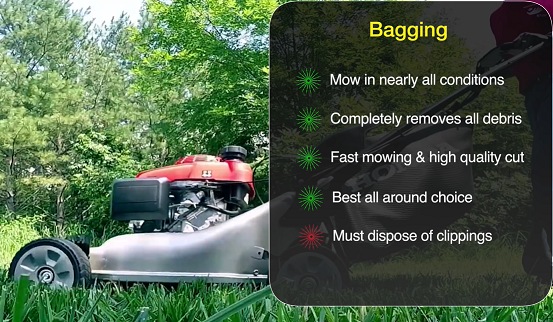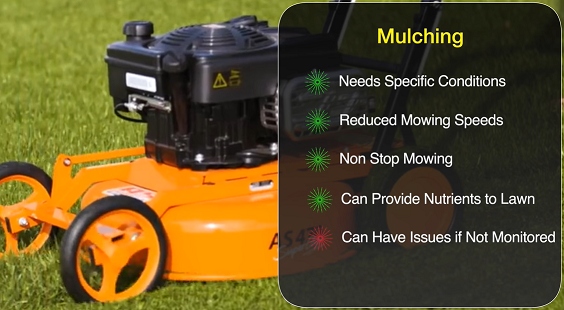If you love to keep the lawn in your home well-maintained, you should already be mowing it regularly. Well, if not, you should be doing it because grass chutes grow pretty quickly, and even a few inches of uncut chutes can make your beautiful lawn turn into a mess. Actually, it’s a great hobby to have since not only it’s a fun activity, it also makes your home look even more beautiful.
However, what most people are confused about is whether they should bag up the clippings or leave them in the lawn to mulch. We are often asked this question, so we thought to disclose the science behind it to you all, and tell us what you should be doing with your lawn clippings, next time you mow your lawn. So, make sure to read this article until the end.
Outline
ToggleBagging
Bagging simply means mowing the lawn, packing the clippings into a bag, and dumping them outside the yard. Well, it sure is a very simple task and extremely easy to do as well. Some advanced lawn mowers come with dumping bags already attached that help you in bagging the clippings easily.
However, in 80% of the cases, we would prefer mulching over bagging. So, what’s the rest of the 20% of cases about? Stay tuned as we will be discussing it later on in this article in detail. Until then, let’s check out how bagging is beneficial for your lawn, and what are its drawbacks that you might need to face.
Benefits
Lawn looks clean: This is quite obvious that if the grass in your lawn is well mowed and evenly cut, any lawn would appear quite beautiful and clean.
Healthier for you: Once you mow your lawn, you basically take out all the dead grass from the lawn, which is good for plenty of reasons. The dead grass is simply home for most disease-causing germs, and dumping that stuff out of your house is a good practice.
No more dealing with muddy grass: On a rainy day, if the grass has grown long in the lawn, it will hold more water on the surface and can make the entire lawn muddy. However, once you are done bagging all the clipping from the lawn, the lawn won’t hold much water and stay neater. In that case, even if your kids decide to play on the lawn, grass clippings won’t stick to their clothes either.
Negatives
Takes a lot of time: When you decide to do bagging, you should know that this is going to be a very time-consuming task for you, especially if you have a big lawn. No lawnmower comes with a bag that can contain all the lawn clippings. You will need to stop and empty the bag frequently when mowing the lawn. So better to decide to do it on weekends when you have plenty of time.
You are wasting a lot of natural fertilizer for your lawn: If you like mowing and maintaining your lawn regularly. You should know that grass also needs essential fertilizers and nutrients to stay fresh and alive. The grass clippings that you bag contains almost 85% water, and a high amount of nitrogen and essential nutrients which work as a natural fertilizer. However, if you decide to bag over mulching, you will have to purchase the fertilizers for your lawn, which eventually make a big hole in your pockets.
Always have to find the right place for dumping: Although bagging is a very simple and easy process, dumping it at the right place is quite important. You can’t just bag the trash and put it out of the yard. In some countries, it’s even banned to bag your yard dump and place it outside.
Mulching
All lawn mowers come with the mulching and discharging function, but what’s important is how often you use this feature. Mulching is basically the process of cutting the grass clippings into finer pieces and discharging them evenly back into the lawn.
Since you cut and discharge the clipping back into the lawn, the process does not even take much time and can be easily done even on working days. As we said earlier, we would prefer mulching over bagging in 80% of the cases, it’s because mulching is much more beneficial for the overall health of the lawn and has plenty of benefits. Let’s check them out.
Benefits
Healthy for the lawn: As we discussed earlier, the grass mainly comprises 85% water, and has nitrogen and other nutrients in high volume. While mulching your lawn, you are not only making it look neater, but the finer pieces of the grass that are discharged in the lawn actually work as natural fertilizers and promote your lawn’s health.
Less time-consuming: Unlike the bagging process, you don’t have to take any breaks to go and empty the bag. Most advanced lawn mowers already have mulching and discharging exits built-in that help you a lot in the process. As you mow the lawn, the grass clippings automatically get cut and keep spreading evenly as you move the mower forward. Hence, there’s no need to do any extra stuff to maintain the lawn. The grass clippings have enough water already that you don’t even need to water the lawn afterward.
Better Appearance: After mulching, the lawn looks much fuller and healthier since all the clippings get evenly spread. Moreover, you will notice the lawn will appear much healthier than ever before.
No headache of dumping: Finding the right location to dump the yard waste is a big headache for most people. However, keeping your clippings in your yard itself won’t trouble anyone else, and is even beneficial for your own lawn.
Negatives
Hard for the mower: Since your mower is working on two different things at the same time during mulching, it can be slightly hard to do for some old mowers.
Wet grass is hard to mulch: If the grass is already wet, and you decide to use your mower on it, you will notice the mower struggling a bit. It’s because wet grass is slightly hard for the mower to cut. Mulching where the clipping needs to be cut into much finer pieces, is even more difficult.
Bagging vs Mulching
If we compare both bagging and mulching, we recommend you decide to mulch most times when you mow your lawn. Bagging might seem easy to most people; however, dumping the yard waste afterward is quite frustrating. On the other hand, mulching is much better than bagging since you utilize the already present grass to fertilize the lawn, so it basically saves you a lot of time and money as well. However, on rainy days, it’s better to bag and keep your lawn as neat as possible. Otherwise, if you mulch on a rainy day, the lawn can get extremely dirty and muddy afterward.
When To Bag Your Grass Clippings
Let’s suppose you don’t get enough time to mow your lawn regularly, and the grass in your lawn has grown quite long. In that case, bagging the clipping after mowing the lawn is the best option for you. Since mulching the long-grown grass is going to make your lawn look like a mess, it may even damage your mower as well. Or, if the grass in your lawn is wet, mulching might not be a good decision at all. Moreover, if the lawn shows you any sign of molds, fungus, or diseased grass, mulching it into a healthy lawn is definitely a bad decision, so bagging is preferred in these cases.
When To Leave Your Grass Clippings
If you love to mow your lawn on a regular basis and maintain it very well, mulching is yet another good deed that you can do for your lawn. When you mow the lawn, you should know that the top third part of the grass clippings mostly consists of water percentage, and are highly nutritious for your lawn. Hence, if you notice a good sunny day, and the grass looks healthy, it’s the best day to mulch. Mulching makes the overall lawn look fuller and it even saves the grassroots from the harsh sunlight and helps the grass to stay healthier for a long time.
Conclusion
If you have read this article until this point, we believe that you are quite aware of both the bagging and mulching process and when they are actually beneficial for your lawn. We would like to say that if the grass in the lawn gets too long or starts to look messy, prefer bagging over mulching. Otherwise, consider mulching if you like to maintain your lawn regularly. In case you have any further queries, make sure to drop them down in the comments section below.



